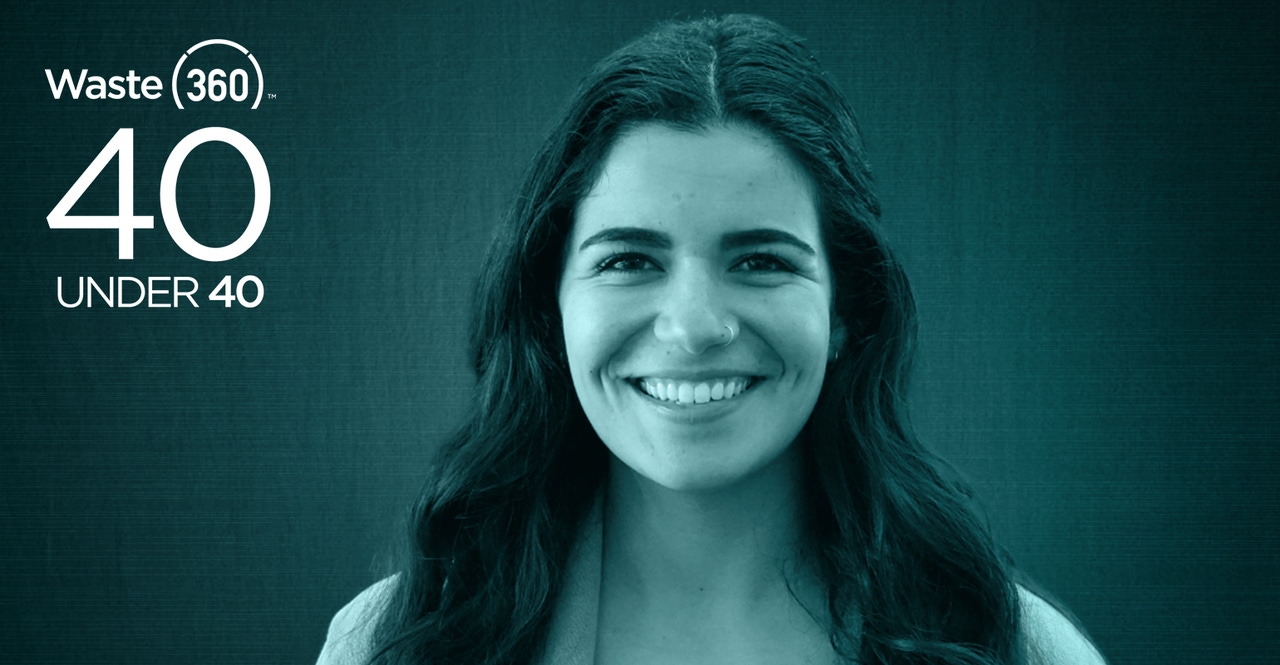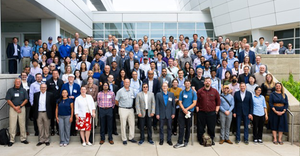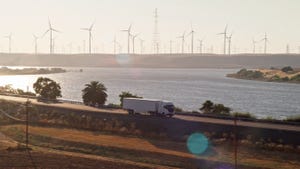Recology’s Mangin Discovers New Paths by Staying Curious
In this Q&A, Julia Mangin discusses traveling down unplanned paths and her work helping California cities reduce organics disposal and meet the goals of SB 1383. And she enlightens on opportunities for waste pros to tackle climate change and advance a circular economy.
July 9, 2024

Julia Mangin believes in seizing opportunity, a conviction that has served her well. That and her ability to learn fast is how she climbed the ranks quickly at Recology, the country’s oldest and among the largest waste management and resource recovery operations. Mangin, who began at Recology as an environmental compliance intern, today runs the company’s Sustainability program.
In this Q&A the Waste360 40 Under 40 Award recipient discusses traveling down unplanned paths and her work helping California cities reduce organics disposal and meet the goals of SB 1383. And she enlightens on opportunities for waste pros to tackle climate change and advance a circular economy.
Waste360: What are your core functions and what might a given day look like for you?
Mangin: As the head of Sustainability my primary role involves tracking and managing Recology’s environmental impact and ensuring that sustainability is embedded in our decision-making and strategy implementation. Fortunately, at Recology, sustainability is central to our core business. This makes my work even more rewarding, as my team and I get to work across our entire operations and with many different business functions to implement our sustainability goals and initiatives. It also keeps my work interesting so that almost every day is different.
One day I might be working with our communications team to draft and publish our annual sustainability report and the next I might be working on projects with our operations and engineering teams to expand our landfill gas-to-energy facilities or explore solar installations at our sites. The opportunity to work with so many different teams on anything related to reducing our carbon footprint or recovering more materials is hands down my favorite thing about my role.
Waste360: Where is there most room for improvement in this industry, and what do you see as the most promising work in reach of those improvements?
Mangin: I think the industry has a lot of opportunity to embrace our position as a solution to climate change and is a critical part of building the circular economy, but there’s a lot of improvements to be made in pursuit of that. Landfills are the third largest source of methane emissions in the United States, so as an industry, we need to be thinking about what role we can play to improve this. Recology operates on the West Coast where we have strong recovery programs aimed at diverting materials from the landfill and keeping materials in circulation, but this is not the case everywhere.
There is meaningful progress being made though, and a lot of it is driven by policy. We’re seeing more states adopt legislation aimed at keeping food waste and other organics out of landfills, and the EPA recently announced a national strategy around reducing food loss and waste and improving organics recycling.
We’re also seeing extended producer responsibility (EPR) legislation get passed or introduced in more states, which aims to hold producers accountable for the full lifecycle of products like plastics and packaging, including their end-of-life disposal and management. These policies have the potential to significantly impact the way waste is viewed and managed in our country, and I’m excited to see how they can push our industry to reduce our climate impact and create more circular systems.
Waste360: “Creating a world without waste” has become a buzz term in waste and recycling. What does it mean to you? How do you work toward this vision?
Mangin: To me, it means building a truly circular economy where nothing is wasted. To accomplish this, we need to work across the value chain to address the gaps in our recycling system. This means working with producers and manufacturers to redesign products and packaging to be reusable, recyclable, or compostable so that all goods are either reused, kept in circulation via recycling, or delivered back to the earth through composting. It means working with municipalities to expand access to recycling and composting programs across the country and securing infrastructure and funding to support those programs. It also means engaging with consumers to ensure strong participation.
As we work towards this vision, the most important thing is that we collaborate. We are just one part of a massive system, but if we all embrace our roles within that system, I think a world without waste can become less of a buzz term and closer to reality.
Waste360: You have been involved in helping California cities reduce organics disposal and meet the goals of SB 1383. How is this work going?
Mangin: SB 1383 is landmark legislation aimed at reducing emissions by keeping organic waste out of landfills and improving food recovery. In my previous role at Recology I oversaw the implementation of SB 1383 across our operations in California. I worked with our operations and jurisdictions to understand the requirements, roll out new programs and services, and implement new processes within our operations to ensure we’re complying.
I’m proud of this work not just because it demonstrates California’s leadership in organics diversion, but also because it was a continuation of Recology’s pioneering efforts starting North America’s first curbside food scrap collection for composting program in San Francisco nearly 30 years ago. There’s still room for improvement to divert more organics in California, and certainly across the country, but it’s a big step in the right direction.
Waste360: What was your first job? Was it your goal from the start to eventually move into a leadership role in sustainability?
Mangin: My first job at Recology was as an environmental compliance intern, which transitioned to a full-time position as an environmental specialist. That role laid the foundation for my knowledge about Recology and our industry as I got to work closely with our operations to ensure our facilities and operational activities complied with federal, state, and local environmental regulations. I later was offered a new role in business development, and from there I moved into sustainability.
I’ve been fortunate to have grown within Recology, and I attribute that to being open to new opportunities, building strong relationships, and exposing myself to as much of the business as I can. While my path to sustainability certainly wasn’t traditional, I had expressed interest in sustainability throughout my career with Recology and sought opportunities to get involved in our sustainability initiatives. Had I not done these things early in my career, I probably wouldn’t be in what I consider to be my dream job today.
Waste360: What is your best advice to a young professional trying to work their way up in the world of waste and recycling?
Mangin: My best advice would be to expose yourself to as much of the industry as possible, stay curious, and say yes to everything you can. Once you’re in, there is so much opportunity to learn, grow, and make an impact as long as you don’t stay stagnant.
My personal philosophy is that the day I stop feeling challenged in my work is the day I need to find something new to explore. That’s served me well at Recology and has led me down paths I didn’t plan for, and I think it can serve other young professionals as well. You never know when the opportunity you say yes to or the question you ask is going to be the one that opens the right door.
Read more about:
Thought LeadershipYou May Also Like


